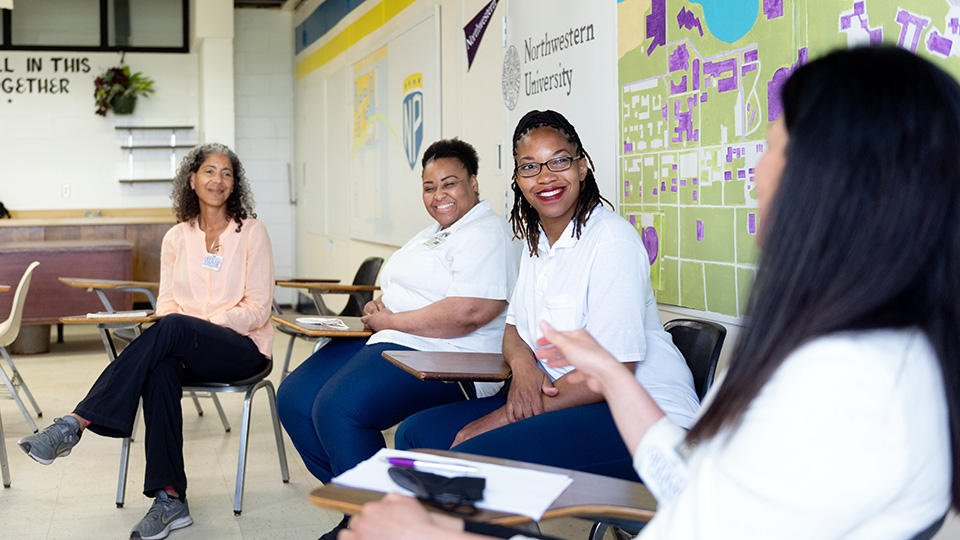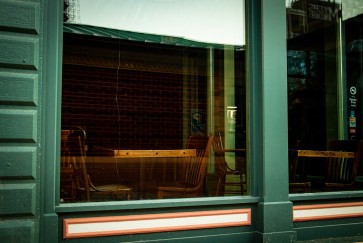In three short years, the Northwestern Prison Education Program (NPEP) has grown from a pilot serving men in a single maximum-security prison into a vast network of faculty and tutors providing an education like none other in the state to people who are incarcerated in two correctional facilities. For the first time ever, women in Illinois can benefit from a full liberal arts curriculum behind bars.
NPEP enrolled its first cohort of 20 students at Logan Correctional Center in March, one year into the pandemic when the Illinois Department of Corrections (IDOC) was restricting visitors to its facilities to mitigate the spread of COVID-19. The students completed spring quarter and their first two courses, expository writing and art history, without the benefit of in-person instruction. It was an immense challenge and an even greater opportunity, the women reported in June, when they were finally able to meet with Northwestern faculty face to face.
Education as redemption
“This educational experience has made me feel like I’ve come full circle, to where I was as a youth, with the same amount of enthusiasm and passion for learning. This is freedom to me, even within these walls,” said Shawnette Green.
As a child growing up on Chicago’s South Side, Green excelled in school.
“I can remember teachers calling my mom in to tell her the hard truth, that they were really not equipped to challenge me, to educate me on the level that they felt like I deserved,” Green said.
Now, Green believes education could have helped her avoid some of the wrong turns that led to her incarceration. Instead, with the opportunity offered by NPEP, education is helping Green redeem and recreate herself.
Now, opportunities for women
In partnership with the Illinois Department of Corrections (IDOC), NPEP offers the only degree-granting program in the state with a full liberal arts curriculum, which includes courses in the humanities, fine arts, social sciences and STEM. Students earn course credits granted through Northwestern’s School of Professional Studies. All the program’s in-prison offerings are tuition free.
NPEP received a $1 million grant from the Andrew W. Mellon Foundation in 2020 to support expansion to the women’s prison.
“As our nation reckons with the systemic racism, inequities and moral failures of the United States criminal legal system, I am thrilled that Northwestern is emerging as a national leader in empowering those who have been most impacted,” said Jennifer Lackey, NPEP director and the Wayne and Elizabeth Jones Professor of Philosophy at Northwestern. “Education is one of the most effective ways of investing in the values that will truly make our communities flourish, and it is critical that these opportunities be extended to incarcerated women, who are far too often forgotten when it comes to inside programming.”
Education is one of the most effective ways of investing in the values that will truly make our communities flourish.”
Beyond the stress, loss and isolation brought on by the pandemic, the newest cohort of incarcerated students have faced additional barriers to education — their gender and the lengths of their sentences.
According to the American Civil Liberties Union, women are the fastest growing segment of the incarcerated population in the U.S., increasing at nearly double the rate of men since 1985. Still, in Illinois and nationally, there are fewer educational opportunities for incarcerated women.
“Expanding higher education opportunities for individuals in custody is a top priority for the Illinois Department of Corrections. Just in the past year, we have increased our partnerships with five universities and colleges that offer degree programs,” said IDOC Director Rob Jeffreys. “The Northwestern Prison Education Program allows incarcerated women to receive a world-class education so they can return home with not only a degree, but the confidence to succeed.”
Higher ed, lower recidivism
Research shows the higher the degree, the lower the recidivism rate. For people who obtain a bachelor’s degree while incarcerated, only 5.6% return to prison once they are released. Each student who is statutorily qualified will earn time off their sentence for participation and completion of the program.
“Over my last decade of being incarcerated, there hasn’t been any programing for us ‘long-termers,’” said Erika Ray, referring to those serving longer sentences for violent crimes, and in Ray’s case, under the accountability rule.
“Since Northwestern has come to Logan, for those of us who got accepted, you can see that people have vision for themselves now,” said Ray, who wants to attend law school and commit herself to criminal justice reform. “Just because you are incarcerated doesn’t mean you don’t have value. I am going to invest in myself because I want people to see we still have value.”
To be a part of the journey
Northwestern faculty and students from a wide range of disciplines and departments teach in NPEP. When in-person courses are permitted, they will travel almost 400 miles roundtrip in a day, from Evanston to Lincoln, Illinois, to teach or tutor Logan students.
“I view education as an empowering and transformative tool to actualize my potential, and I am honored to be a part of the educational journey of the 20 amazing women at Logan,” said Sanjana Subramaniam, a Ph.D. student in mechanical engineering and NPEP director of academic support and development, as well as a tutor. She runs the correspondence program, pairing each student at Logan with two Northwestern student-tutors and providing support.
With COVID-19 case numbers declining earlier in the summer, Subramaniam visited Logan for the first time in June and had the opportunity to meet in-person with many of the students, including Ray, who she has been tutoring via correspondence for months.
“We have to fix the systems that caused these women to end up where they are,” Subramaniam said. “These students have so much potential; if they weren’t in prison, they could be professors right now.”


